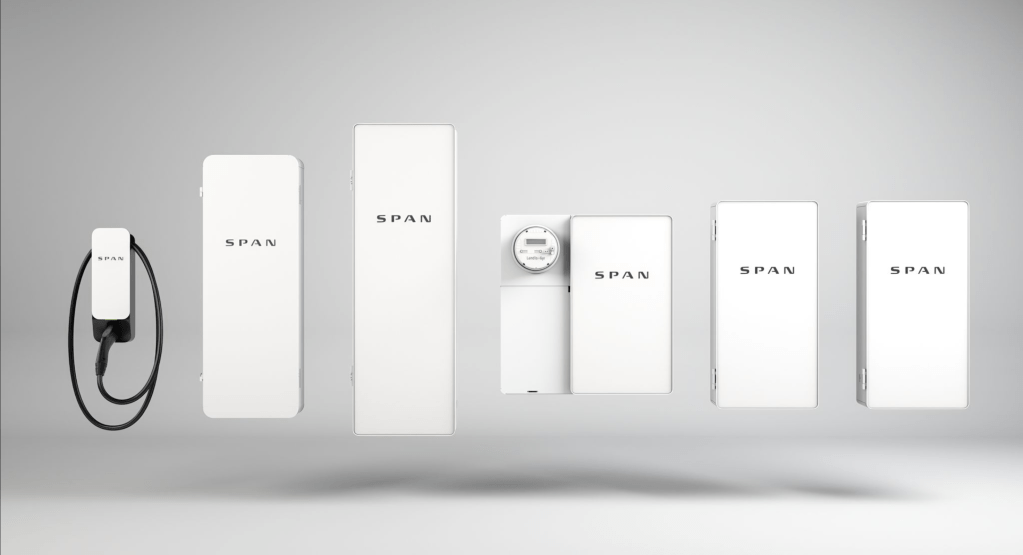
It has been a big few weeks for smart electrical panel-maker Span. The company announced major deals with Pulte Homes and utilities with Landis + Gyr. The startup also expanded its lineup to include small home and apartment-sized panels and even subpanels
But firstly, why do we even need $3500 smart electric panels?
We last caught up to Span last year when they announced a smart EV charger and funding.
Founded by the former head of Powerwall development and Tesla Energy Arch Rao, Span has been creating smart circuit breaker boxes for homes for a few years.
Rao left Tesla in 2018 at a tumultuous time when Tesla was diverting Gigafactory Nevada batteries from home storage into its new Model 3 and was also fumbling its solar roof efforts while managing its controversial Solar City acquisition.
Span smart circuit boxes were launched in 2020 at a price of $7000 and require specialized electrician installations in low numbers.
Since then, the price has halved to $3500 (or $2900 after the IRA tax credit), and the number of Span installers has expanded, leading to much lower costs and, with this week’s announcements, much-expanded capabilities.
Why Span smart circuit breaker boxes?
As people dump petroleum-based vehicles and home heating and move to EVs and heat pumps, the electrical service lines that homes use are getting taxed. Even 240V/200A service, which a few years ago was very high end, can almost entirely be used up by a few EVs and a whole-house heat pump system. An 80A EV charger will take close to half of 200A service.
With dumb panels, electricians are limited to those 200A, or they’re forced to bring in more power from the street, which can cost thousands or even tens of thousands of dollars along with a lot of time and effort.
Enter the smart panel. Span panels can monitor home power usage and turn off high-power-use items like car chargers, pool pumps, and water heaters when the capacity starts to fill up. Users can set priorities, and there are 32 different smart breakers to wire up many household items.
Solar and Batteries
It isn’t just EVs and heat pumps that are going into new homes. More and more people are looking to solar and battery storage to help mitigate energy costs and outages. These each require a huge breaker and, on dumb panels, eat into those allotted 200A.
Span helps manage these pieces of technology as well. Span can set the home to be run off solar and save energy-intensive operations like charging EVs and Powerwalls for low-energy-cost timeframes.
Obviously, with Rao’s history with Tesla, Powerwalls, Tesla inverters, solar panels, and gateways are fully supported. But other major batteries, such as Franklin WH, Enphase IQ Battery, and LG Chem RESU2 SolarEdge Energy Bank, are also supported.
Span Announcements
Span announced this week that smaller 24-circuit and 16-circuit model boxes are available for smaller homes, apartments, and commercial usage. These can also be utilized as smart subpanels, and there’s even a panel with a built-in meter that is being tested and readied by utilities (details forthcoming).
SPAN Panel 48 – The largest addition to the SPAN Panel family, the SPAN Panel 48 is geared towards new home construction, enabling builders to avoid expensive infrastructure costs when building all-electric or future electric homes, with best-in-class energy management, storage and charging capabilities of SPAN Panel 32.
SPAN Panel 32 – Currently available and deployed across the U.S., SPAN Panel 32 serves both the retrofit and new home construction categories, providing software-defined, whole-home backup management when paired with one of several compatible energy storage systems, as well as reducing the costs of electrification.
SPAN Panel 16/24 – Focused on retrofit electrification, SPAN Panel 16/24 is a field-adaptable, smaller Panel form factor that enables SPAN PowerUp functionality for major electric load additions, reducing both hardware and labor costs compared to larger panel form factors.
SPAN Meter 8 – Designed to offer unparalleled capabilities when paired with smart meters, SPAN Meter 8 offers utility/grid operators advanced metering, submetering, demand flexibility and better utilization of the distribution infrastructure.

There’s also a bigger 48-breaker panel coming for new homes. Prices aren’t set yet, and obviously, installers will get discounted prices in bulk.
More announcements are expected in the next few months, which should be exciting for Span.
Electrek’s take:
As I’ve added solar, batteries, EVs, and heat pumps, not just for HVAC but also for water heating and clothes washing, I’m feeling the strain on my 200A service. Our electrician initially recommended running another 200A line that would cost over $10,000. Another option was only having 1 EV charger (which we split with a Neocharge)
Installing a Span will run a fraction of the cost, allow us to add EV chargers and, as a bonus, will allow me to better monitor and control the loads going into and out of my home. That will also save money in the short term and we’ll likely be able to move to better rate plans in the longer term.
I’m fairly confident that I won’t need to do much in the way of mitigation because our house, when not heating and car charging, uses less than 2kW of electricity out of the 50kW coming in. We’ve also removed 240V dryers and replaced them with 120V heat pump modelss and are moving from a 240V water heater to a 120V heat pump water heater.
I’ll have a review of the Span after my upgrade is done in a few months.
Author: Seth Weintraub
Source: Electrek



